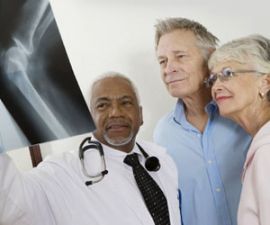 You might not realize how serious a broken bone can be. They sound painful, and you know they take time to heal… but did you know that a broken bone can lead to devastating results?
You might not realize how serious a broken bone can be. They sound painful, and you know they take time to heal… but did you know that a broken bone can lead to devastating results?
Now, I’m not talking about your average break. I’m actually talking about a broken hip due to osteoporosis. I’ll tell you exactly what osteoporosis is and what you can do to prevent it in just a moment, but first I want to underscore the seriousness of that broken hip I just mentioned.
A broken hip will commonly lead to at least some time in an assisted-living facility.
• Twenty-five percent of women who suffer a broken hip due to osteoporosis will need long-term assisted living care.
• One in five women with an osteoporosis-related hip fracture will die within one year.
Don’t Underestimate The Health Of Your Bones!
As you age, your bone mass can begin to diminish. It becomes harder for your body to maintain new, healthy bone mass. When this happens, bones become more prone to breaking.
Now, most of my male patients will chalk osteoporosis up to being a woman’s disease. And it is true that 80% of osteoporosis cases happen to women. But I want to give all you men out there two reasons to take osteoporosis seriously.
First, one in five cases of osteoporosis strikes a man. Second—and this is the situation more likely to affect you—I’m sure that many of you have a woman in your life, and regardless if it’s a mother, wife, lover or a good friend you certainly want the best for them. And osteporosis or a hip facture is not something you can just ignore.
The first step to preventing or treating osteoporosis is to get a bone density test. Women, make sure this is part of your next physical exam. Men, make sure the women in your life know they need to get a bone density test.
Now if you do have osteoporosis, there are prescription drugs out there to treat osteoporosis. I try to avoid them because they can cause complications. Two of the most common drugs are Fosamax and Boniva. Both can cause bone loss in the jaw, which can be very painful. They also require you follow stringent guidelines in how you take them or they can damage your stomach and esophagus.
Healthy Answers For Strong Bones…Naturally!
With proper nutrition and fitness, you can prevent osteoporosis or at least slow its progress way down. I encourage my patients to take a natural approach whenever possible.
First, middle-aged women who are at risk or in the early stages of osteoporosis should do weight bearing exercises at least three times a week and resistance exercise two times a week. Talk with your doctor before beginning an exercise program, so you know if you need to take safety precautions and what kinds of exercises are right for you.
Next, boost your bone building nutrients. You’ll want to focus on four things: calcium, vitamin D, vitamin K, and magnesium.
Calcium: You need 1200 mg of calcium each day. It’s best to get as much as possible from food sources like dairy products (yogurt is my favorite) and dark leafy greens. You should also plan to take a supplement. Research shows that calcium supplements slow the progress of osteoporosis.
Vitamin D: Vitamin D is also crucial for healthy bones. You need 800 IU each day. Studies show that this amount of vitamin D reduces fracture risk and improves bone density.
Vitamin K: Our understanding of the role vitamin K plays in bone formation is in its early stages. What we do know is that you do need vitamin K in order to keep your bones strong. You should aim to get 45 mg each day of vitamin K2.
Magnesium: A deficiency in magnesium contributes to bone loss. Magnesium supplements can help you to maintain or improve your bone strength. Take at least 400 mg each day.
By taking simple steps toward better nutrition and better fitness you can help keep your bones strong and healthy throughout your whole life.
Stay well,
Mark Rosenberg, M.D.
Photo Credit: retirenet.com
